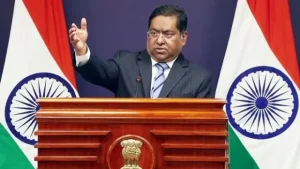
Last Updated on April 24, 2025 11:44 am by BIZNAMA NEWS
Pakistan’s airspace closure is part of a broader retaliatory package following India’s strong diplomatic offensive. Islamabad has also mirrored India’s border closure by shutting down the Wagah border and has reciprocated the visa restrictions by suspending all SAARC visas for Indian nationals, with a limited exception for Sikh pilgrims
R. Suryamurthy
Responding to India’s assertive measures following the deadly terrorist attack in Pahalgam, Pakistan on Thursday announced the immediate closure of its airspace to all Indian-owned or Indian-operated airlines. This move, coming swiftly on the heels of India’s own set of punitive actions, signals a sharp escalation in the already strained relations between the two neighbors.
Just two days after the Pahalgam attack, which claimed the lives of 26 people, mostly tourists, Islamabad unveiled its countermeasures, with the airspace closure being the most immediate and impactful. This action directly mirrors India’s strong diplomatic offensive, which included the suspension of the Indus Waters Treaty and the closure of the Attari-Wagah border.
The closure of Pakistani airspace has sent immediate shockwaves through India’s aviation sector. Top executives from major carriers like IndiGo and Air India are now in emergency huddles, scrambling to redraw flight paths for their international services that routinely transit Pakistani airspace.
“The unavoidable rerouting, particularly for our flights heading to Europe and the United States, will add significant mileage and, consequently, inflate our operational expenditures. Passengers should brace for an inevitable hike in airfares,” a high-ranking official from a leading Indian airline conceded.
Air India took to X to confirm the disruptions, informing passengers that select flights to and from North America, the UK, Europe, and the Middle East would now operate on extended routes. IndiGo, in its statement, acknowledged the potential impact on some international flight schedules due to the airspace closure, stating they were working to minimize inconvenience and advising passengers to check their flight status and rebooking options.
SpiceJet admitted that its flights to the UAE originating from North India would necessitate rerouting and additional fuel, though the airline maintained that its overall schedules would likely remain largely unaffected. Queries sent to Akasa Air and Air India Express regarding the airspace closure remained unanswered.
This is not uncharted territory for Indian carriers. An experienced airline executive recalled a similar five-month airspace shutdown by Pakistan in 2019, following the Pulwama terror attack. “If this current closure mirrors that duration, the financial implications for Indian airlines could be substantial,” the executive warned.
Official figures presented to the Rajya Sabha after the 2019 closure revealed a collective loss of over ₹540 crore for Indian carriers. Air India bore the brunt, with losses amounting to ₹491 crore, while private players like SpiceJet, IndiGo, and GoAir also suffered significant financial setbacks. Air India’s own post-closure assessments indicated an added cost of approximately ₹20 lakh for a one-way US flight and ₹5 lakh for a one-way European flight. Industry insiders anticipate that these additional costs could be even higher in the current scenario, given the considerable expansion of Indian carriers’ international operations since 2019.
Data from aviation analytics firm Cirium shows that Air India now operates 1,188 international flights weekly, a 56.7 percent surge compared to April 2019. Flights to Europe and North America, heavily reliant on Pakistani airspace, have seen even more dramatic increases. IndiGo’s international operations have also expanded significantly.
Pakistan’s airspace closure is part of a broader retaliatory package following India’s strong diplomatic offensive. Islamabad has also mirrored India’s border closure by shutting down the Wagah border and has reciprocated the visa restrictions by suspending all SAARC visas for Indian nationals, with a limited exception for Sikh pilgrims. Furthermore, Pakistan has matched India’s diplomatic expulsion by declaring Indian defense and military advisors persona non grata and reducing the staff strength at the Indian High Commission in Islamabad. Islamabad has also put bilateral agreements on hold and rejected India’s move on the Indus Waters Treaty.
While India has directly blamed Pakistan for the Pahalgam attack, Pakistan has vehemently denied these allegations.
Aviation analyst Mark D Martin of Martin Consulting described the timing of the escalation as “extremely bad” for airlines, coinciding with the peak summer holiday season. He predicts significant ticket price hikes and increased operational costs.
The duration of Pakistan’s airspace closure remains uncertain, but the immediate impact on Indian aviation is undeniable, setting the stage for potential financial and logistical turbulence in the coming days and weeks.






